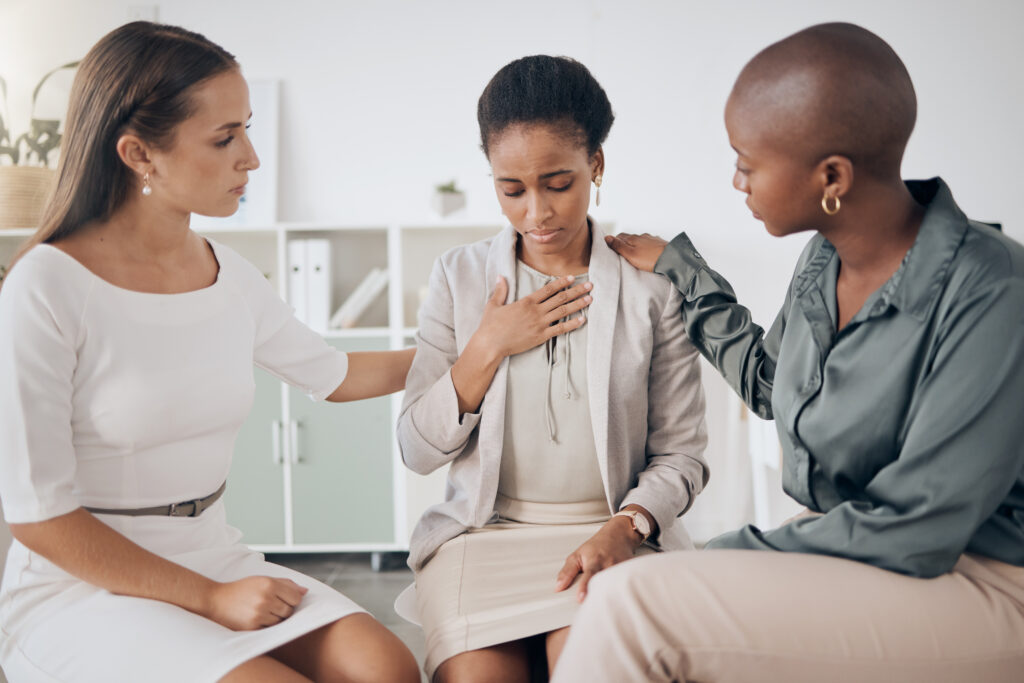Tips for Supporting a Family Member with Addiction
Jan 30, 2023
Supporting a family member with addiction can be difficult, but there are ways to help them on their journey to recovery. One important tip is to educate yourself about the substance they are struggling with, whether it be drugs or alcohol. Understanding the nature of addiction and the effects of the specific substance can help you better support your loved one.
It is also important to find a qualified counselor or therapist who specializes in addiction and recovery. They can provide guidance and support for both you and your family member. Remember that recovery is a long-term process and it’s important to be patient and non-judgmental. Encourage your loved one to seek help and support them in their efforts to overcome their addiction.
This article covers the signs of addiction abuse, the do’s and don’t of helping someone with an addiction, and how to find a counselor who specializes in recovery from drug abuse, alcohol abuse, and other substance abuse.
Physical And Behavioral Signs of Addiction
Signs of Addiction
Addiction can be a difficult condition to identify, but there are certain signs that can indicate a problem. One of the most common physical symptoms of addiction is a lack of control over the substance of abuse, including the inability to stop using or decrease use over time.
Other physical signs can include unusual behavior or changes in mood or work performance. Additionally, depression, loss of interest in hobbies and decreased socialization are also common signs of addiction.
Other signs of addiction include a loss of control over the use of the substance, and an unusual increase of time spent obtaining, using, or recovering from its effects.
It is important to note that these signs of addiction can manifest differently for each individual and should be considered as a symptom of a larger problem. If you suspect that a loved one may be struggling with addiction, it is important to seek professional help as soon as possible.

Behavioral Signs of Addiction
Behavioral Signs
Behavioral signs involve a person’s outward relations with the world whereas physical signs relate to the body’s manifestation of side effects due to the presence of drugs in the system. Behavioral signs include but are not limited to:
Obsessive Thoughts And Actions
Acquiring and using the drug becomes the main priority of life while all or most other obligations including work, family, or school are sidelined. Changes in mood may include depression and a decrease in participation in things they used to enjoy.
Disregard Of Harm Caused
Although the drug abuse is causing physical and mental distress to the individual and their loved ones, the person struggling with addiction continues using drugs or alcohol.
Loss Of Control
Even in the face of wanting to stop or reduce their drug use, the person cannot do so. They experience a loss of control and a feeling that they have the inability to change their behavior.
Denial Of Addiction Or Hiding Drug Use
When confronted, the person battling addiction will deny or downplay their drug use. To avoid having to explain themselves to others, the person may do drugs in secret.
Drug abuse cannot remain hidden for long. Its impact is too dramatic, and the person using drugs can spiral out of control fast. Changes in behavior, neglecting responsibilities, exhausting financial resources, and engaging in criminal conduct are some of the most obvious signals of a drug problem. Family members, loved ones, and coworkers are usually in the best position to recognize a drug problem as they are familiar with the person’s behavior and habits — drug abuse cannot be hidden for long.
Physical Signs of Addiction
Physical Signs
Physical signs of addiction can manifest as a side effect of abuse, during an overdose, or as a result of withdrawal. It may be very difficult for someone to pinpoint the cause of the physical signs, but severe effects will require immediate medical treatment. Also, it is important to understand that withdrawal symptoms arise when the body adjusts to the absence of familiar quantities of a drug. It is a natural process, but withdrawal can be dangerous without professional help.
General physical signs of addiction include but are not limited to:
- Enlarged or small pupils
- Sudden weight loss or gain
- Bloodshot eyes
- Insomnia
- Unusual body odors
- Poor physical coordination
- Looking unkempt
- Slurred speech
It is important to note that these signs of addiction can manifest differently for each individual and should be considered as a symptom of a larger problem. If you suspect that a loved one may be struggling with addiction, it is important to seek professional help as soon as possible.
Typical signs of an overdose may include but are not limited to:
- Drowsiness or trouble walking
- Agitation
- Aggression or violent behavior
- Difficulty breathing
- Nausea and vomiting
- Hallucinations
- Delusions
- Loss of consciousness
If you suspect someone is overdosing, it is important to act quickly and call 911 immediately. While waiting for medical help to arrive, administer naloxone if it is available, and provide rescue breathing if the person has stopped breathing. Stay with the person and monitor their condition until help arrives. It is important to remember that an overdose is a medical emergency and time is of the essence, so seeking professional help as soon as possible is crucial. Additionally, it is important to not leave the person alone and to not try to make them “sleep it off” as this could lead to serious injury or death.

Tips For Helping A Family Member With Addiction
Do’s and Don’ts of Helping Someone Who Has an Addiction
If you have a loved one who is struggling with addiction, it can be difficult to know how to help them. Some of the do’s and don’ts to keep in mind:
- Do…
- Encourage them to seek professional treatment for their addiction.
- Educate yourself about the substance they are addicted to and the effects it can have on the person.
- Show love and support for the person, not just their addiction.
- Be there for them during their recovery journey.
- Help them access medication-assisted treatment, if appropriate and available.
- Don’t…
- Try to intervene or force them into treatment without their consent.
- Ignore the problem or pretend it doesn’t exist.
- Place blame or make the person feel guilty for their addiction.
- Enable their addiction by providing them with the substance they are addicted to.
- Neglect your own self-care or the needs of other family members.
- Be afraid to ask for help from professionals or support groups.
Remember, addiction is a complex issue that requires professional care, medication, and support. The most important thing you can do is to be there for your loved one and help them access the resources they need to recover.
Things You Can Do To Help Someone With Addiction
What To Do
When a loved one is struggling with addiction, it’s important to approach the situation with empathy and understanding. Positive actions to help include setting boundaries, being a supportive listener, encouraging professional treatment, and modeling healthy behavior. It’s also important to remember that recovery is a journey and to be patient and supportive throughout the process.
Here are 5 things you can do when helping someone who has an addiction:
1. Educate Yourself About Addiction
It can be challenging to navigate a loved one’s struggle with addiction, especially if you have limited experience with the disease. You may notice changes in your partner’s behavior and feel like your relationship is taking a backseat. This can be emotionally and mentally taxing for you as well, and may strain your connection with them.
Research the addiction the person is suffering from. Learn about the substance they are abusing or the behavior they are exhibiting. Search for information online from reputable sources, join support groups or online chat forums, seek to understand what the person is experiencing, see what treatment options there are (including medication), and speak with a behavioral health specialist.
2. Address the Issue, Not the Person with the Addiction
It can be difficult to talk to your loved one about their addiction, as it is a sensitive subject. They may be experiencing difficult emotions like shame and frustration. They may be hesitant to open up about their struggles for fear of rejection or retaliation.
To start the conversation, approach it calmly and focus on sharing your feelings and the impact their behavior has had on your relationship, rather than blaming them. Using “I-statements” can help keep the conversation rooted in your own experience and create a more open and respectful dialogue.
“I-statements” focus on your own experience. Instead of accusing them of certain behaviors or actions, express how those actions have affected you and your relationship with them. This approach can help to reduce defensiveness and create a sense of teamwork as you work together to address the problem. For example, instead of saying “you are being careless,” try saying “when x happens, I feel worried about our safety.”
Avoid terms like “addict” or other derogatory and accusatory terms.
3. Set Health Boundaries
It’s understandable that you want to help your loved one who is struggling with addiction. However, it can be difficult to navigate the line between being supportive and enabling their addiction. Without realizing it, you may be enabling their addiction by lending them money or covering for their behavior. This can prevent them from facing the consequences that may motivate them to seek help. While your intentions are good, it’s important to remember that you can’t control their behavior or fix their problems.
Setting boundaries and communicating your needs can help create a healthier dynamic in your relationship while supporting your partner’s recovery.
4. Research Treatment Options
If your spouse is still in active addiction, it may be difficult for them to accept your help at this time. Addiction is a progressive disease, and without intervention, it can worsen over time. To prepare for the future, it’s important to research different addiction treatment options, including organizations that offer medication assisted treatment (MAT).
Look into treatment center programs and services, and determine which one might be the best fit for your loved one. Remember, you can’t force your partner or spouse into rehab, but being informed and prepared can help when they are ready to seek help.
5. Speak With an Addiction Treatment Specialist
One of the best things you can do to help a person you love who is suffering from addiction is to speak with an addiction treatment specialist. These professionals are trained to provide guidance and support to individuals and families who are dealing with addiction. They can help you understand the disease of addiction, and provide you with the tools and resources you need to help your loved one on their journey to recovery.
Whether you are looking for information on rehab centers, therapy options, clinics with behavioral health services, or medication-assisted treatment, an addiction treatment specialist can help you find the right solution for your loved one.
Things NOT To Do When Helping Someone With Addiction
What Not To Do
When it comes to helping someone who is struggling with addiction, it is important to approach the situation with care and understanding. However, there are certain actions that can be counterproductive and even harmful to the individual’s recovery process. Some common mistakes to avoid include enabling the addiction by providing financial or emotional support, using ultimatums or force to push them into treatment, and using judgmental language or behavior towards the person. It’s important to remember that addiction is a disease and the person suffering from it needs support and love, not criticism.
Here are 5 things NOT TO DO when helping someone who has an addiction:
1. Don’t Look Down on Them
It’s natural to feel upset and frustrated when a loved one is struggling with addiction, but constantly criticizing them for their actions can make the situation worse. Addiction impairs judgment, and your loved one may not always be acting rationally. Instead of judging them, try to understand the impact that drugs and alcohol have on their behavior.
It’s also important to be mindful of the language you use when speaking to them. Avoid using hurtful or derogatory terms and remember that they need love and support, not judgment. They are going through a difficult time, and it’s essential to show them compassion and empathy.
2. Don’t Ignore The Problem
Ignoring the signs of addiction in a loved one is a common response, but it can lead to further deterioration of their condition. Denial may be tempting, but it can prevent the person from getting the help they need. If your partner is struggling with a substance use disorder, it’s important to acknowledge the issue and not make excuses for their behavior. Instead, try to understand the severity of their addiction and encourage them to seek professional treatment. Your loved one may also be aware of their addiction but unsure of how to ask for help. In that case, start by opening up a conversation and expressing your concerns in a non-judgmental way. This may be the push they need to take the first step toward recovery.
3. Don’t Force Them To Quit
Using “tough love” is not an effective approach to helping a loved one with addiction. Court-ordered rehab may be an option in certain cases, but ultimatums or forcing someone into treatment is not a long-term solution. For lasting change to occur, the person must be motivated and willing to seek help for themself.
Instead of demanding that your loved one goes to rehab or gets help, it’s better to set boundaries and communicate your expectations. For example, you can let them know that you will not be present when they are using drugs or alcohol, or that you don’t feel safe with those substances in the house. This lets them know what you expect moving forward, while also emphasizing that the boundary is for your own well-being and not an attempt to control their behavior. Remember, change has to come from within the person who is struggling with addiction, not from others.
4. Don’t Enable Them
It can be challenging to know how to support a loved one struggling with addiction, as it requires walking a fine line between being supportive and enabling their harmful behaviors. Enabling can occur through actions such as lending them money without control over its use or making excuses for their lack of follow-through on commitments. These actions often happen unknowingly, as a result of being in a codependent relationship where boundaries are not effectively established.
To foster a healthier relationship, it’s important to set boundaries, prioritize your own needs, and communicate clearly about what you can and cannot support. Additionally, it’s crucial to take a step back and evaluate if your own feelings and needs are being given equal consideration before taking any action.
5. Don’t Give Up
It may be frustrating when your loved one refuses to seek help or experiences a relapse, but don’t lose hope. Addiction can mask a person’s true personality, but it is possible for them to overcome it and for the relationship to heal. Remember, if you were going through addiction, you would want your partner’s continued support. Your own hope can be a powerful force for change, and by modeling hope and support, you may inspire your loved one to do the same.
Recovery is a challenging but achievable journey, and having a strong support system can make a significant difference. Keep in mind that “the opposite of addiction is connection,” and by providing an outlet for meaningful connection, you can be a powerful motivator for change.

Addiction Treatment in Wichita, Kansas
Taking the Next Step to Getting Addiction Help
If you are searching for “addiction treatment near me” or “addiction treatment in Wichita, Kansas,” we can help.
At HealthCore Clinic, our culturally appropriate mental health and substance abuse services are designed to reduce stigma and provide a comfortable and safe environment for addiction treatment and other behavioral health issues.
Our staff of Licensed Addiction Counselors, Psychologists, Psychiatrists, and Therapists are here to help you and your loved one when you are ready.
Our substance abuse and dependency treatment services include:
- Dedicated Behavioral Health Department
- Medication-Assisted Treatment (on-site pharmacy)
- Drug & Alcohol Consultations
- After Treatment Care
- Open AA Group
- Drug & Alcohol Evaluations
- Outpatient Group & Individual Sessions
- Free After Treatment Care
- Alcohol & Drug Education Program (ADEP)
- Free and Open AA group
Financial concerns should not be a barrier to receiving high-quality healthcare services, such as addiction treatment. We accept KanCare / Medicaid, Medicare, CHIP and private insurance. We also offer sliding scale fees and prescription assistance for those not covered by insurance — meaning you pay based on what you can afford.
Contact us today by calling 316-691-0249 or request an appointment through our online contact form.
At HealthCore, you’re more than just a client, a customer, a patient—you’re a valued member of our wellness community. Our integrated, whole-body approach wraps you in care. That’s our mission, our core. Caring for you and promoting a healthy community.